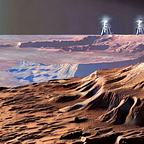Artificial Cells: Merging Biology and Artificial Intelligence to Create Life from Scratch
The Dawn of Artificial Cells
Imagine a world where scientists can create life from scratch. This fascinating concept is no longer a far-fetched idea but a rapidly emerging reality in the field of synthetic biology. With the help of artificial intelligence (AI), researchers are now developing artificial cells that could lead to groundbreaking discoveries in medicine, environmental science, and beyond. In this article, we’ll explore how the power of AI is revolutionizing our understanding of biology and enabling us to create life from scratch.
What are Artificial Cells?
Artificial cells, also known as synthetic cells or protocells, are cell-like structures created from non-living materials that mimic certain aspects of living cells. These structures typically consist of a lipid membrane that encloses a small volume of chemicals, allowing them to carry out essential cellular functions like metabolism, replication, and communication. By recreating the properties and behavior of living cells, artificial cells can help scientists understand the fundamental processes of life and pave the way for novel applications in biotechnology and medicine.
AI-Powered Synthetic Biology
The development of artificial cells requires a deep understanding of the complex interactions between biological molecules and cellular processes. This is where AI comes into play. Machine learning algorithms, a branch of AI, can analyze vast amounts of data to identify patterns and relationships that are difficult or impossible for humans to detect. By applying AI to synthetic biology, researchers can accelerate the design and construction of artificial cells and explore new avenues in the creation of life from scratch.
Applications of AI-Driven Artificial Cells
The potential applications of AI-driven artificial cells are both numerous and diverse. Let’s take a look at some of the most promising areas where artificial cells can make a significant impact:
- Medicine: Artificial cells can be engineered to deliver drugs or gene therapies directly to specific cells or tissues in the body. By precisely targeting the delivery of these treatments, artificial cells can reduce side effects and increase the effectiveness of therapies for diseases like cancer, diabetes, and genetic disorders.
- Environmental Science: Artificial cells can help address pressing environmental challenges by cleaning up pollution or converting waste materials into useful products. For example, researchers are developing artificial cells that can break down plastic waste or absorb heavy metals from contaminated water, offering new solutions for waste management and environmental remediation.
- Energy Production: Artificial cells can be designed to produce biofuels or other forms of renewable energy. By harnessing the power of photosynthesis or other natural processes, artificial cells could provide a sustainable alternative to fossil fuels and contribute to the fight against climate change.
- Food Production: The development of artificial cells could revolutionize the way we produce food. Scientists are working on creating artificial cells that can synthesize essential nutrients, paving the way for new food sources that are both sustainable and nutritious.
Ethical Considerations in Creating Life from Scratch
As we continue to explore the possibilities of creating life from scratch, it’s essential to consider the ethical implications of this groundbreaking research. Some of the key questions that need to be addressed include:
- What is the definition of life, and does it apply to artificial cells?
- What are the potential risks associated with creating artificial cells, and how can they be mitigated?
- How can we ensure that the benefits of artificial cell research are distributed equitably and do not exacerbate existing social inequalities?
By engaging in thoughtful discussion and considering the ethical aspects of this emerging field, we can ensure that the development of artificial cells is guided by responsible principles and practices.
The Future of Life from Scratch
Artificial cells represent a new frontier in the intersection of biology and AI. As we move forward, the potential for groundbreaking applications in medicine, environmental science, energy production, and food security is staggering. With AI-driven advancements in synthetic biology, we are closer than ever to understanding the mysteries of life and unlocking the potential of artificial cells to improve our world.
Collaborative Efforts to Accelerate Progress
The development of artificial cells and the creation of life from scratch are complex tasks that require collaboration between researchers across various disciplines. As AI continues to advance, interdisciplinary teams of biologists, chemists, computer scientists, and engineers will work together to overcome challenges and develop innovative solutions. By fostering collaboration and sharing knowledge, we can accelerate progress and bring about the transformative potential of artificial cells in various industries.
Embracing the Unknown
The journey to create life from scratch is filled with unknowns and challenges. However, it is through embracing these uncertainties that we can make remarkable discoveries and drive innovation. As we continue to explore the possibilities of artificial cells, we must be prepared to face obstacles, learn from our mistakes, and adapt our approaches to achieve success.
A World Transformed by Artificial Cells
In conclusion, the fusion of biology and AI holds the key to unlocking the potential of artificial cells and creating life from scratch. As we push the boundaries of our understanding and embrace new challenges, the world stands to benefit from the vast array of applications that artificial cells can offer. From revolutionizing healthcare to tackling environmental issues, the impact of AI-driven artificial cells will be felt across various aspects of our lives, heralding a new era of scientific discovery and innovation. Dive into this fascinating world and discover how the creation of life from scratch could reshape our future.
Like the article? Don`t forget to follow us on Medium! Also interesting content on our Instagram, Facebook, and Twitter
